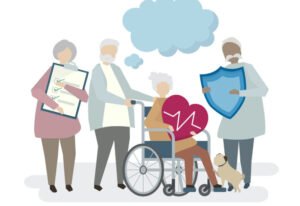Playback speed:
With the rising incidence and prevalence of dementia worldwide that is projected to continue, more efforts have been invested to address the needs of persons living with dementia and individuals around them. One such effort is the development of assessment tools and instruments in the field of dementia care.
Some uses of the assessments include:
- Measuring the progress of dementia-related impairments (cognitive, functional), or
- Measuring the effects of dementia treatments in clinical trials, and
- Evaluating the impact of psychosocial interventions in enabling persons living with dementia to live well, amongst other assessments.1
Other than studying dementia assessment tools and instruments, researchers and clinicians also study the reliability and utility of the methods for validating and reporting dementia assessment tools and instruments. An ideal measure should be valid, reliable and practical to use. It should not use too much of the assessors’ and participants’ time.
In addition, as dementia may, from its earliest stages, affect cognition and language abilities, it is important to have both persons living with dementia and their proxies, such as family caregivers and care professionals, involved in the assessment process.2 All these factors should be taken into consideration when choosing an assessment or instrument to be used in dementia care and research.
Singapore’s Ministry of Health (MOH) has developed a set of Clinical Practice Guidelines on Dementia. These guidelines list a number of recommended assessment tools to be used for cognitive screening, ratings of behaviour changes, and assessment of functional status and of social issues for persons at risk of dementia, for the process of diagnosis, and for persons who have been diagnosed with dementia.3
In the following nine documents, studies of some existing measures in dementia care have been consolidated and organised according to the purposes, strengths and limitations, and psychometric properties of the measures. You can find the embed links to the original journal articles and assessments/instruments in these articles for your further reading.
Tools & Resources
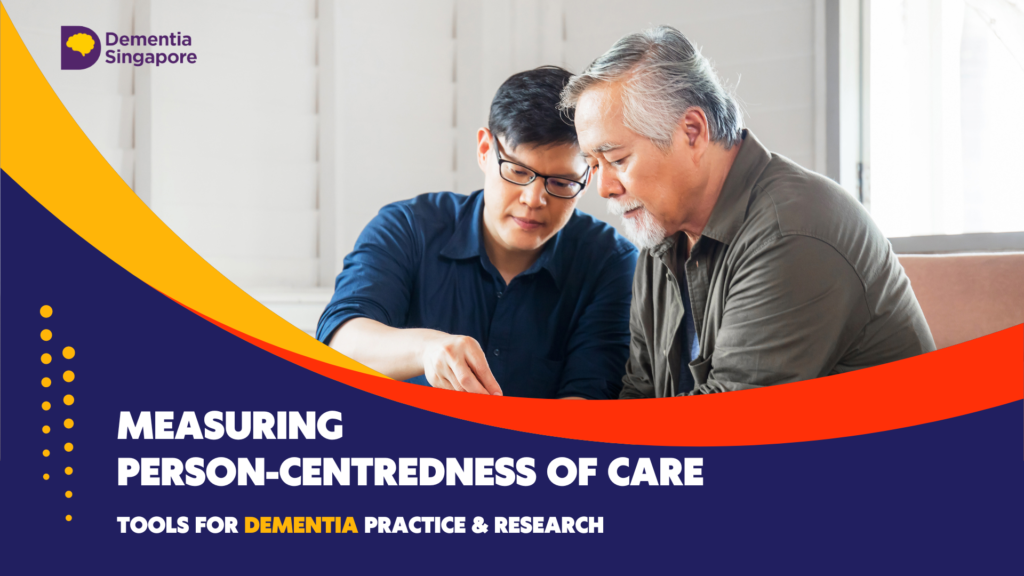
Measuring Person-centredness of Care
Person-centred Care (PCC) is a philosophy that views individuals using healthcare and social services as equal partners in planning, developing, assessing, and monitoring care to ensure it meets their needs.
This resource lists and provides information about existing measures of PCC in the context of dementia care.
These measures include the Dementia Care Mapping tool, VIPS Assessment Tool, and Person-Directed Dementia Care Assessment Tool.
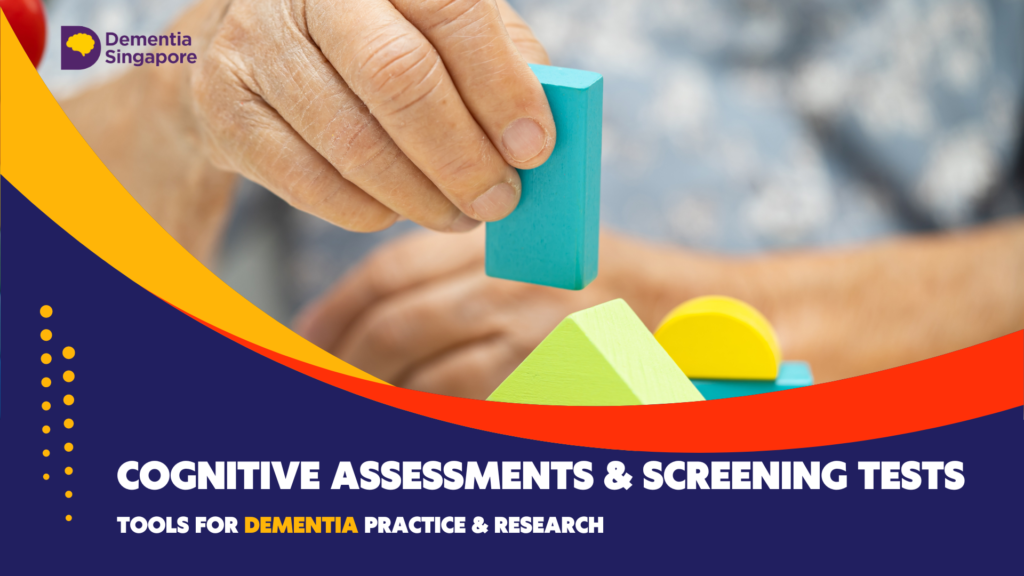
Cognitive Assessments and Screening Tests
This resource lists and provides information about cognitive assessment and screening tools. These tools are used to both identify individuals showing symptoms of dementia and to monitor the progress of cognitive deterioration.
These measures include the Singapore version of the Abbreviated Mental Test (AMT), the Mini Mental State Examination (MMSE), and the Singapore version of the Montreal Cognitive Assessment (MoCA).
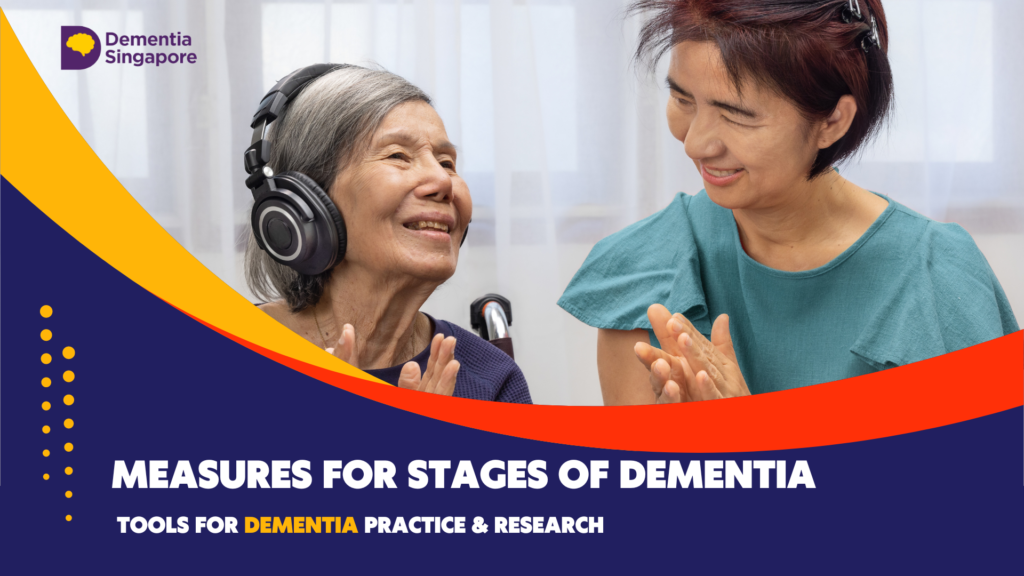
Measures for Stages of Dementia
Dementia is a progressive condition, and in the field of dementia care, there are different systems available to measure, describe, and classify the progress of an individual person’s condition.
This resource lists scales that both measure aspects of a person’s condition and classify the progression of their condition into stages in their classification systems.
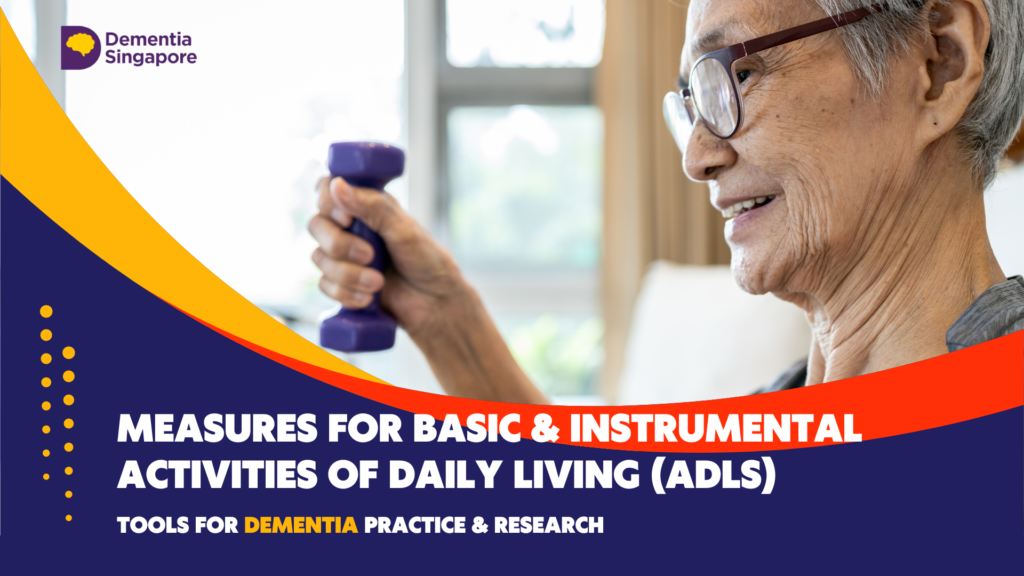
Measures for Basic and Instrumental Activities of Daily Living (ADLs)
Basic and instrumental activities of daily living (ADLs) are tasks one must perform to function in everyday life. This resource lists and provides information about tools used to measure the degree to which a person can perform everyday tasks. Some of these tools are designed for use with persons living with dementia, and some for use beyond this specific population.
The scales listed include the Bristol Activities of Daily Living Scale (BADLS), Shah Modified Barthel Index (MBI), and Pool Activity Level (PAL) Checklist.
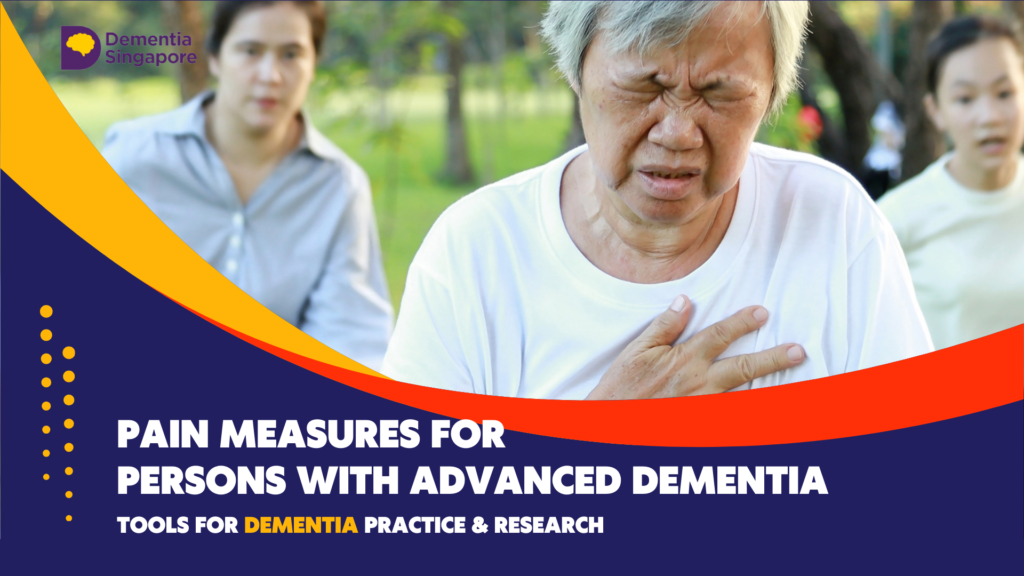
Pain Measures for Persons with Advanced Dementia
This resource lists observational pain measures (pain measures that require observing a person’s behaviour) that are more appropriate for persons with limited communication abilities.
These include the Abbey Pain Scale, Non-Communicative Patient’s Pain Assessment Instrument (NOPPAIN), and the Checklist of Nonverbal Pain Indicators (C.N.P.I.).
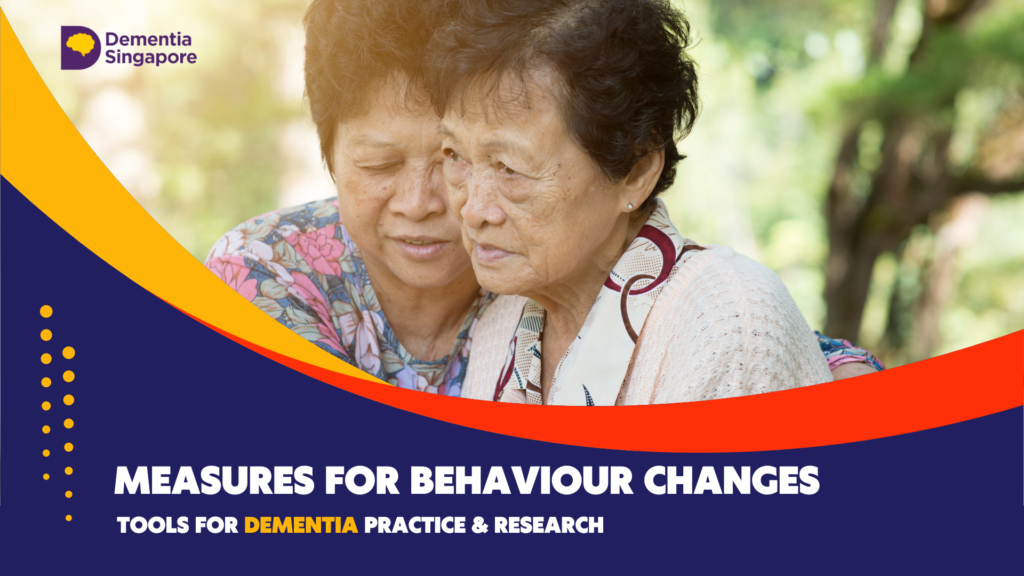
Measures for Behaviour Changes
Behaviour changes often happen as the condition of the person living with dementia changes. Some common changes in behaviour observed as dementia progresses include sleep disturbances, repetitive speech or actions, or a loss of behavioural inhibitions.
This resource lists and provides information about instruments used to assess behaviour changes in the field of dementia care.
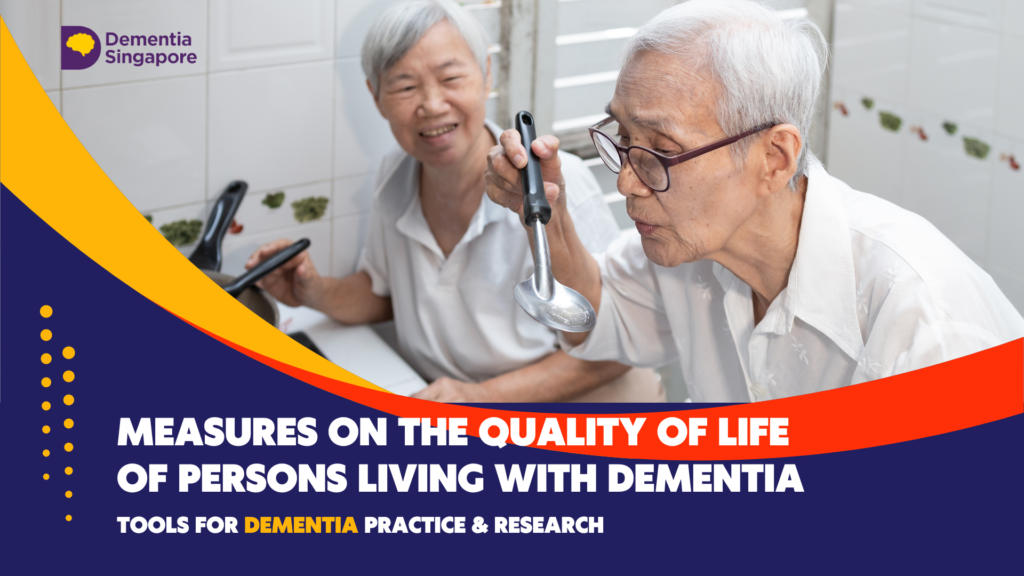
Measures on the Quality of Life of Persons Living with Dementia
This resource lists instruments used in the field of dementia care to measure the quality of life of persons living with dementia, or instruments used to measure constructs related to quality of life.
These instruments include the Dementia Care Mapping (DCM) tool, the Bradford Well-being Profile (WBP), the Bath Assessment of Subjective Quality of Life in Dementia (BASQID), and the Dementia Quality of Life Measure (DEMQOL).
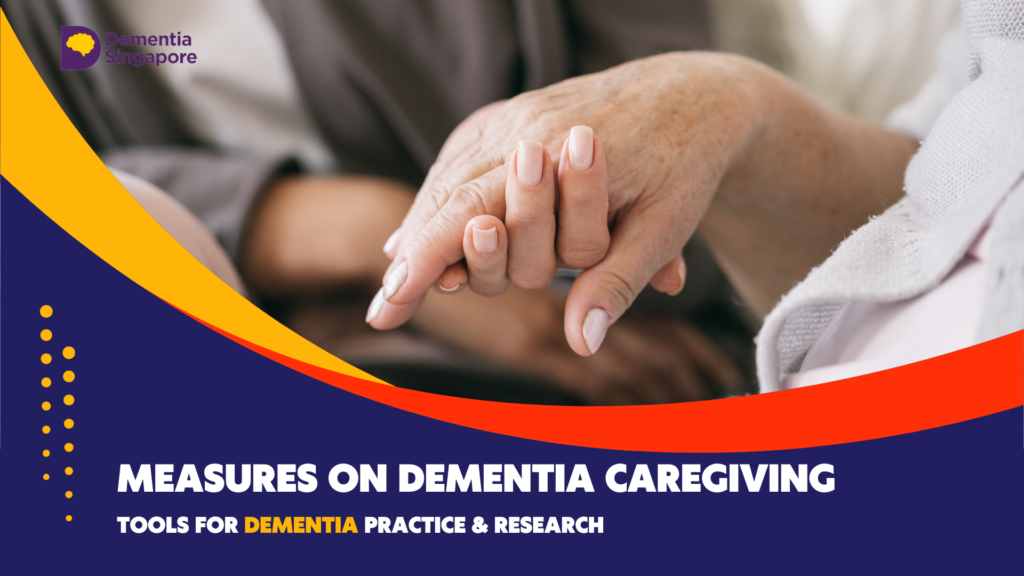
Measures on Dementia Caregiving
This resource lists and provides information about existing measures of various aspects of caregiving, including caregiver stress, caregiver burden, caregiver gains, the meaning caregivers find through caregiving, caregiver competence, and caregiver self-care self-efficacy, in the context of dementia care.
These measures include the Gain in Alzheimer care INstrument (GAIN) scale, the Short Form Zarit Burden Interview (ZBI-12), and the Sense of Competence Questionnaire.
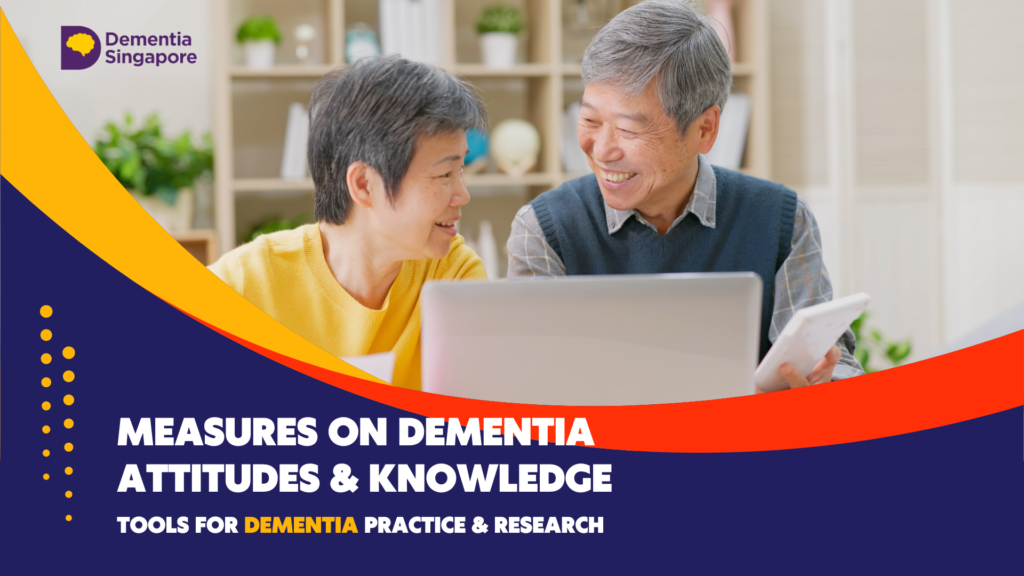
Measures on Dementia Attitudes & Knowledge
This resource lists and provides information about measures of attitudes that persons in general have towards dementia and what they know about the condition.
These measures include the Dementia Attitudes Scale (D.A.S.), Dementia Knowledge Attitude Scale (D.K.A.S.), and Knowledge in Dementia (K.I.D.E.) Scale.
Tell us how we can improve?
1. Burns, A., Lawlor, B., & Craig, S. (2002). Rating scales in old age psychiatry. The British Journal of Psychiatry, 180(2), 161–167. https://doi.org/10.1192/bjp.180.2.161
2. Sheehan, B. (2012). Assessment scales in dementia. Therapeutic Advances in Neurological Disorders, 5(6), 348–358. https://doi.org/10.1177/1756285612455733
3. Singapore Ministry of Health. (2013, July 10). Dementia: MOH Clinical Practice Guidelines 1/2013. Person-directed dementia care assessment tool. https://www.moh.gov.sg/docs/librariesprovider4/guidelines/dementia-10-jul-2013—booklet.pdf




